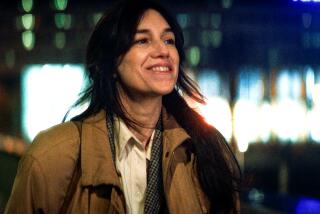PAGE TO SCREEN
- Share via
According to Franco Zeffirelli, director of the newest adaptation of Charlotte Bronte’s “Jane Eyre,” “Every generation revisits the classics with the culture, the politics, the world in which we live.” Consider that he’s saying this on a cell phone while being chauffeured across New York’s 59th Street Bridge, 3,000 miles away.
Fortunately, the book doesn’t have to be tortured into some sort of relevance with the cellular world. Jane is a modern heroine, smart, ambitious, independent, yet insecure because of her appearance and her station in life. In fact, because she is plain, she’s a good deal more accessible than the aerobicized models prancing across our contemporary novels and movie screens. The same holds true for the object of her affections, Edward Rochester.
Jane’s story consists of a series of hurdles thrown in her way by fate and the conventions of her time. She loses both parents, rejects the second-class citizenship conferred upon her by her obnoxious relatives, and is sent to what amounts to an orphanage. Her romance with Rochester, whom she serves as a governess, is doomed when it is revealed that he is already married--to a madwoman. Leaving him, she finds shelter with an excessively pious clergyman who wants her to become a self-denying little pilgrim. Chin up, Jane!
Inevitably, Zeffirelli’s film, which stars the appropriately severe Charlotte Gainsbourg as Jane and the credibly tormented William Hurt as Rochester, trims away the plot. The director did this by closing his eyes.
“When you close your eyes,” he says, “you remember the material as if it were a movie rather than the written page. You scan your memory and you get only direct answers, not complicated answers.”
The clergyman, who consumed nearly a quarter of the book, was a complicated answer. Zeffirelli simplified him by moderating him, so that now he accounts for a mere handful of script pages.
Perhaps the most delicate engineering feat is the scene in which Jane leaves Rochester. In the book, Rochester plies her with all kinds of inducements to stay, chief among them being the offer to leave and live together abroad. Jane is sorely tempted. Still, obeying conventions, she will not live with him in sin. Zeffirelli makes her decision a more secular, pragmatic one: She leaves him because he deceived her.
“It’s so right, that ethical position,” Zeffirelli says. “If you live together the rest of your lives, every day is a battlefield, every day is a test. The scrutiny is endless. Why do most divorces happen? Because the person you thought was the right one disappoints you; because he’s devious or he reveals things that you don’t appreciate or don’t admire and you want to trust your partner blindfolded. I think it’s a good lesson.”
More to Read
Only good movies
Get the Indie Focus newsletter, Mark Olsen's weekly guide to the world of cinema.
You may occasionally receive promotional content from the Los Angeles Times.










